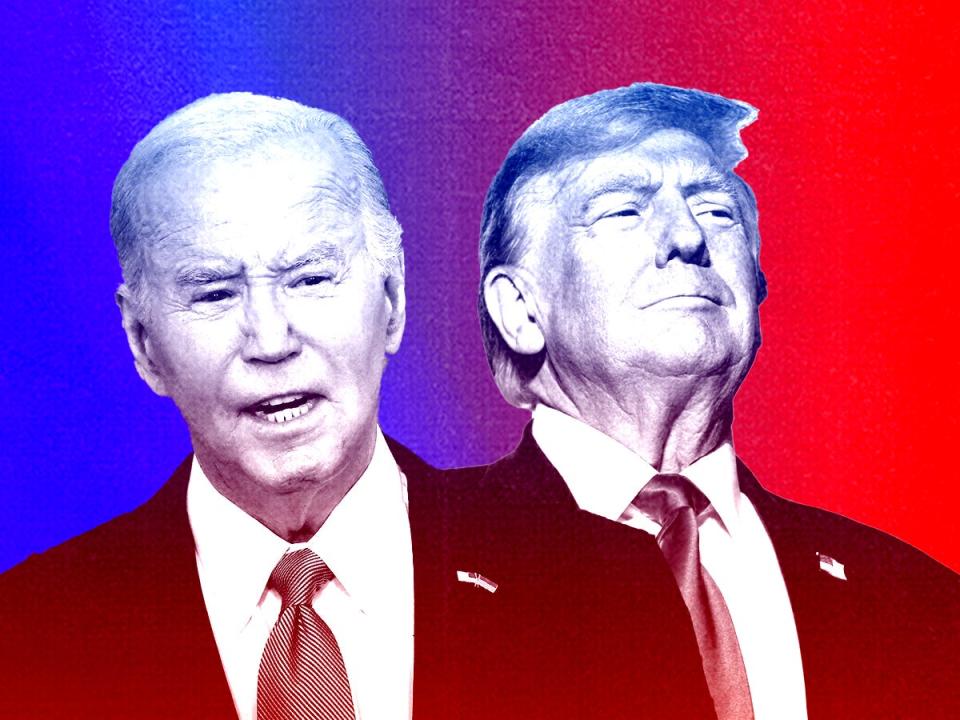A Trump vs. Biden rematch is on, and it's a showdown most Americans didn't want

Joe Biden and Donald Trump on Tuesday became their parties' presumptive 2024 presidential nominees.
Neither of them faced significant competition in the primaries.
Polling suggests many US voters have long dreaded the head-to-head.
President Joe Biden and his predecessor Donald Trump have clinched their parties' nominations for the 2024 presidential election — a rematch that long seemed both inevitable and largely disfavored by voters.
On Tuesday night both candidates passed the delegate thresholds needed to become their parties' presumptive nominees following contests in Georgia, Mississippi, Washington, and Hawaii.
As of early Wednesday, Biden had passed the benchmark of 1,968 that Democrats require for him to win with 2,107 pledged delegates, per the Associated Press' tracker. Trump, needing 1,215 for the Republican Party's nomination, had secured 1,241 bound delegates, per the AP.
Neither candidate faced serious competition, with only the Republican Nikki Haley — who dropped out of the race last week — gaining more than a handful of delegates, at 94, per the AP.
The result sets the US up for a replay of the contentious 2020 election, the results of which have long been falsely challenged by Trump. It's poised to be the first rematch between the two major-party candidates in a US presidential election in 70 years.
Trump acknowledged the primary result in a vitriolic post on Truth Social, saying it was a "great honor" to represent the GOP while calling his opponent "crooked Joe Biden" and calling the USA under his leadership a "Third World Country."
"Let's go," Biden wrote on X, in a post that featured a video with a voiceover of him saying: "This is a time of choosing. So let us choose the truth."
"Are you ready? Are you ready to defend democracy?" the voiceover continues.
Let’s go: https://t.co/V9Mzpw8kB0 pic.twitter.com/jMr65EcleN
— Joe Biden (@JoeBiden) March 12, 2024
A Reuters/Ipsos poll published in January indicates that a Biden-Trump rematch is one most American voters didn't want to see.
In the nationwide poll of 1,250 US adults, 70% of respondents, including half of Democrats, said Biden shouldn't seek reelection. But Trump also seems to be widely unpopular, with 56% of respondents in that poll, including a third of Republicans, saying he shouldn't be seeking another term.
The age of the candidates is widely viewed as a key factor in explaining their unpopularity.
Biden, who is 81, is the oldest president in US history, while Trump, who is 77, would be the second-oldest if he were to win office again.
The poll found that three-quarters of voters said Biden was too old for the job, including half of Democrats, and that half of voters said Trump was too old, including a third of Republicans.
Both candidates also face a broader range of hurdles.
Trump is battling the fallout from his tumultuous first term, his efforts seeking to overturn his 2020 defeat to Biden, and his 91 criminal charges.
The 2022 Supreme Court decision overturning Roe v. Wade, which was backed by Trump, who appointed several of the justices behind the ruling, could also damage his reelection chances, particularly among women.
Biden, meanwhile, is facing mounting unpopularity over his migration policies and sharp divisions over his handling of the Israel-Hamas war. Crime is another sore point, and voters are at most uncertain over his handling of the economy.
Even the most committed Democrats and Republicans seem uninspired by the rematch, said Michael J. Boskin, a professor of economics at Stanford University, for Project Syndicate.
"Trump also has a loyal, energetic base, whereas Biden's re-election bid generates almost no enthusiasm, even among Democrats," Boskin wrote. "Still, many Americans strongly oppose a second Trump term and more than 20% of those who voted in the Republican primaries say they won't vote for Trump."
Correction: An earlier version of this story misstated the date of the Reuters/Ipsos poll on Trump and Biden. It was published on January 25, not on March 13.
Read the original article on Business Insider

 Yahoo Autos
Yahoo Autos 